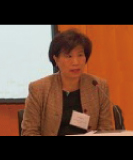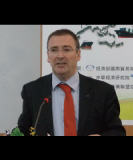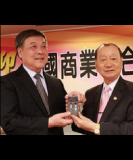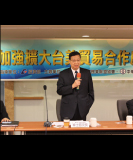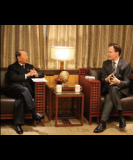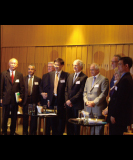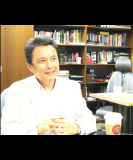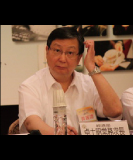You are browsing > Service in Taiwan > Development
Members press EU and UK to address concerns of reduced market access following BrexitWTO
WTO members at the Goods Council meeting held on 14-15 November pressed the European Union and the United Kingdom to address concerns of reduced access to the two markets after the UK withdraws from the EU. Members also heard concerns raised over the EU’s trade remedies and non-tariff barriers on agricultural products.
Fifteen WTO members drew attention to Brexit-related trade concerns, citing commercial disruptions caused by repeated extensions of the UK's withdrawal date and apprehensions that third countries would be crowded out of EU and UK tariff rate quotas (TRQs) if no trade agreement is brokered between the two sides.
TRQs are prized by traders due to the lower tariffs these confer to goods that fall within the quota. Many WTO members worry, however, that EU and UK proposals to split up the current EU TRQs would reduce the flexibility to move products between the UK and the rest of the EU-27. Members further noted the elimination proposed for 60 of the current 142 TRQs, which cover around 400 tariff lines. This amounts to EUR 28 billion worth of EU imports in 2018, members said. WTO members would suffer a loss of market access for 55 products in the UK market and five products in the EU market, they said.
The EU said that an orderly withdrawal of the UK is the preferred option and that detailed information has been published to reduce commercial uncertainties. The EU reassured WTO members that it is willing to continue negotiations in an open and fair manner regardless of the scenarios for the UK's withdrawal.
EU's trade remedies and non-tariff barriers
EU regulations for trade remedies, particularly Regulation 2017/2321 and Regulation 2018/825, were raised for discussion at the Goods Council for the first time. The Russian Federation indicated that the EU's determination of whether an import had significant price distortions and its calculation of anti-dumping duties were inconsistent with WTO rules.
The EU said the regulations complied with WTO rules. Its alternative anti-dumping calculation method is country-neutral and its measures are aimed at enhancing trade defence instruments by enabling more transparency, accelerated decision making and supporting small and medium-sized enterprises, the EU said.
Twenty-seven WTO members furthermore reiterated concerns over the EU's regulation of pesticides in crops. Members again said the EU measures were prohibiting the use of more substances particularly deployed in tropical climates and that these prohibitions were not based on international standards. The EU said its measures complied with WTO rules and are necessary to protect consumer health. It nevertheless assured members it was committed to continuing discussions.
China's restrictions on imported scrap materials
While recognizing the responsibility of governments to protect the environment and public health, the United States expressed concerns that China's July revision of its draft law on environmental pollution continues to define "solid waste" to include all scrap materials and bans these imports. Canada, New Zealand and the EU shared similar concerns that the restrictions are disrupting recycling programmes worldwide.
China, as in previous meetings, said residue from recycling and disposal process of solid waste will pollute the environment and harm human, animal and plant health.
Indonesia's trade policies and practices
Members expressed concern over recent developments in Indonesia's nickel export ban and local content requirements for telecommunication devices and reiterated previous concerns on Indonesia's halal certifications and quantitative restrictions on horticultural products. The Council heard that Indonesia brought forward its nickel export ban to 1 January 2020, two years ahead of the initial plan. Indonesia was also reported to have issued new measures that may reinforce and broaden existing local content requirements for telecommunications devices.
Indonesia said it did not consider that its trade policies and practices have restricted trade as statistics indicate trade deficits since 2012 due to increasing imports. Indonesia added that flows of substandard imports and the loss of Indonesian jobs have been increasing. However, it assured members that it will continue efforts to simplify trade procedures and review regulations periodically.
India's quantitative restrictions on imported pulses
Australia and Canada questioned the short window of time India provided in October for pigeon pea imports to reach its ports. Members said this threatens to destabilize the global pulses industry. The United States, EU, Ukraine and New Zealand also reiterated previously aired complaints on India's other import restrictions on pulses. Russia further sought clarification on India's Social Welfare Surcharge of 10% of aggregate duties on most imported products, which is meant to raise funds for education projects.
India responded that its quantitative restrictions on pulses were aimed at alleviating the distress farmers faced from the influx of cheap imports. Regarding the surcharge, India said it will relay the concern to its capital.
Progress on beverage taxes and car import measures
Switzerland and the EU welcomed Saudi Arabia's and the United Arab Emirates' decisions to expand their tax base by 1 December to include other sweetened beverages, thus no longer discriminating against soft drinks containing sugar. However, both members expressed concern that Gulf Cooperation Council (GCC) countries have not decreased the tax for energy drinks. For Switzerland, some beverages were subject to 100% tax while others were not, thus indicating a clear breach of WTO principles against discrimination. Switzerland further noted that the situation remains uncertain in Oman. The United States and Japan registered similar concerns.
Bahrain, speaking also on behalf of Saudi Arabia, Oman and the United Arab Emirates, said that the GCC was assessing the replacement of the ad-valorem tax on sweetened beverages with a specific tax as part of the second phase of its regulatory reform.
The United States lauded Viet Nam's plans to ease certain restriction on imported cars and parts by eliminating lot-by-lot testing requirements and allowing self-certifications of conformity with safety and emissions regulations. The United States, along with Russia, the EU and Thailand, asked Viet Nam to continue providing information and working with WTO members to ease the trade measures. Viet Nam affirmed that the government has indeed decided to revise the relevant measures in order to facilitate trade.
United States measures on ICT products
As in previous meetings, China expressed concerns over US measures that restrict trade in information and communications technology (ICT) with buyers and suppliers that pose a potential security threat. The US replied in both cases that the Goods Council was not the appropriate forum to discuss issues relating to national security.
China also raised a previous concern over Australia's market access prohibitions for 5G equipment. Australia reiterated that its measures are consistent with WTO rules.
Other issues
A proposal by Argentina, Australia, Canada, Costa Rica, the EU, Japan, New Zealand, Chinese Taipei and the United States to improve members' compliance with transparency obligations was brought to the attention of the Council again.
The United States, on behalf of the proposal's sponsors, updated the Council on consultations with other members aimed at balancing incentives to comply with transparency obligations with administrative measures for those that fail to meet the requirements.
Members that took the floor emphasized again the importance of transparency for the proper functioning of the WTO. Some members reiterated their view that the proposal provided a good basis for discussion while others restated their concerns over the punitive approach of the proposal and the resource constraints that make compliance difficult for members.
Members also continued discussions on how to improve the functioning of the Goods Council and its subsidiary bodies based on a suggestion made by Hong Kong, China, to use annotated agendas and tentative calendars of meetings. Informal consultations will follow on this issue.
Members took up other issues and trade concerns on the 38-item meeting agenda, including those raised in previous meetings. The full agenda of the meeting is available here.
Next meeting
The dates of the next Council meetings for 2020 will be communicated to members soon.

